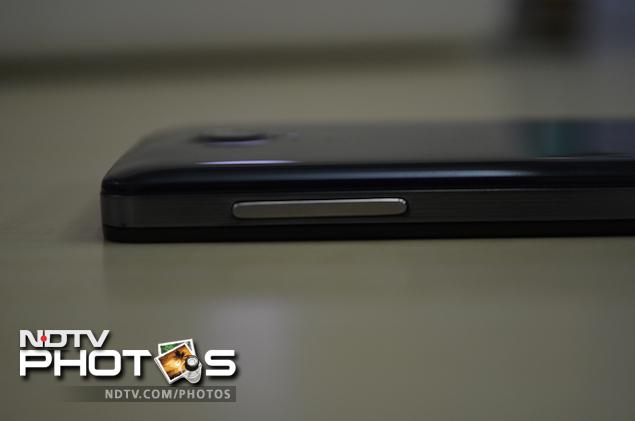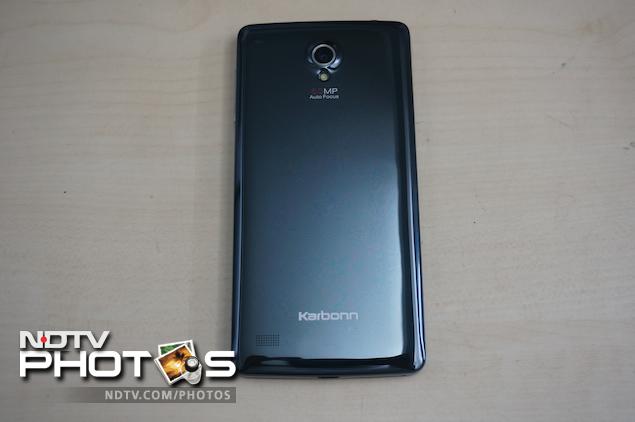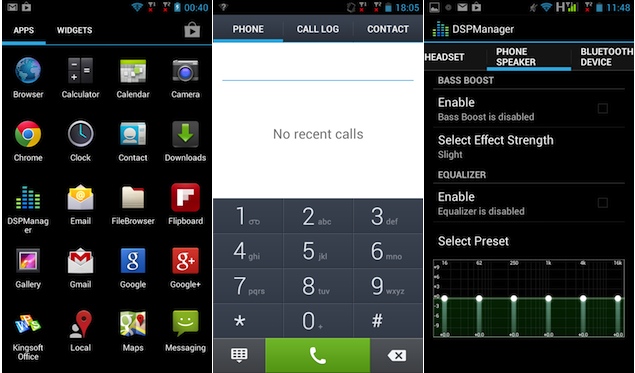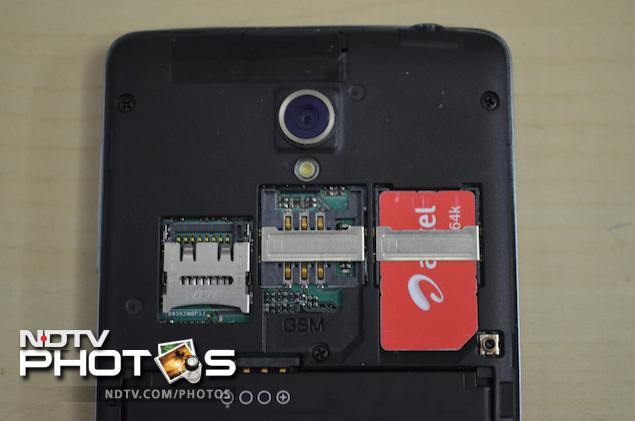- Home
- Mobiles
- Mobiles Reviews
- Karbonn S1 Titanium review
Karbonn S1 Titanium review
By Anupam Saxena | Updated: 20 January 2014 14:47 IST

Click Here to Add Gadgets360 As A Trusted Source

Advertisement
After the launch of the Micromax Canvas HD, quad-core processors started trickling down to budget Android smartphones. The Karbonn S1 Titanium is one such phone. It's got a 4.5-inch screen so you can't exactly call it a phablet. Unlike other budget phones that are powered by a quad-core processor, this one doesn't run on a Mediatek chip but on a Qualcomm Snapdragon S4 chip. The phone is available at a price point of Rs. 10,990. We try to find out if it's one of the better budget Android smartphones.
Build/ Design
The Karbonn S1 Titanium is a plain looking phone bearing the usual rectangular slab design with rounded corners. The front of the phone features the 4.5-inch qHD display, four capacitive touch buttons for navigation, and the front camera lens, in addition to the proximity sensor and the earpiece. The bezel is not that wide on the sides but it takes up a major part of the front extending above and below the screen. The order in which the capacitive controls are placed is a little awkward. More on that when we talk about the phone's user experience.
 There's a grey frame surrounding the phone on the sides that has a brushed metal finish. The volume rocker is located at the right side of the phone, while the Power/Screen lock key and the 3.5mm headset jack sit at the top. We feel that the Power key should have been placed on the side instead of the top, as it's a little cumbersome to reach.
There's a grey frame surrounding the phone on the sides that has a brushed metal finish. The volume rocker is located at the right side of the phone, while the Power/Screen lock key and the 3.5mm headset jack sit at the top. We feel that the Power key should have been placed on the side instead of the top, as it's a little cumbersome to reach.
The Micro-USB port is located at the bottom of the phone.
The back of the phone is made of plastic and is extremely glossy. You could use it as a mirror but it's a fingerprint magnet and it'll be full of smudges as soon as you start using the phone. The rear camera lens is located towards the top along with a flash. There's some Karbonn branding towards the bottom.
 The back cover is removable and hides the battery compartment. The two SIM card slots and a microSD slot are located just above the battery compartment. The SIM cards and the microSD card can be placed without removing the battery. However, you'll need to restart the phone if you insert a new SIM card while the phone is on, in order to start using the cellular services.
The back cover is removable and hides the battery compartment. The two SIM card slots and a microSD slot are located just above the battery compartment. The SIM cards and the microSD card can be placed without removing the battery. However, you'll need to restart the phone if you insert a new SIM card while the phone is on, in order to start using the cellular services.
Display
The S1 Titanium comes with a 4.5-inch qHD IPS screen that has a resolution of 540x960 pixels and pixel density of 240ppi, which is decent, and graphics and text appear sharp. The viewing angles looked good. However, it's really difficult to read or take pictures in sunlight, as the screen is extremely reflective. Videos and pictures looked good but colours appeared to be a little saturated.
Software/ Interface
The Karbonn S1 Titanium runs Android 4.1.2 Jelly Bean. Karbonn has not skinned the OS barring some elements of the user interface, such as the notification tray. The notification tray includes toggles for settings such as Wi-Fi, Brightness, Rotation, Bluetooth, GPS, and mobile data. There are five customisable home screens that can be filled with app shortcuts and widgets. The notification tray also features a settings shortcut and a clear all notifications button, along with expandable notifications (expanded with the two finger pull gesture).
As we mentioned earlier, the phone features four capacitive buttons for navigation - Home, Menu, Back and Search, for respective functions. We found the placement of the Home button a little odd. The Search button is a relic from the past and it just opens the Google Now app. The Home button also doubles up as the app switcher on long press, but we observed that the phone did not register long press a lot of times. We'd like all manufacturers to switch to the three soft controls that are included in the Stock version of the OS or just go with 3 capacitive keys instead of 4, to maintain consistency.

Android 4.1 Jelly Bean also brings in Google Now, which needs to be initialised for the first time, before use.
For the uninitiated, Google Now is a voice-based information assistant and an extension of Google search. You can ask questions and the tool returns answers or search results. It uses 'cards' which are essentially small boxes that offer different sets of information ranging from weather forecast, directions, traffic information, scores, appointments, and currency conversion, among others. Google Now collects information based on the user's behaviour, location, and even e-mail, to offer information automatically.
Karbonn has also bundled some apps with the phone including a DSP Manager for controlling sound input, a File Browser, Flipboard, Yahoo Messenger, nexGTV, Paytm, POPi (an m-commerce app), a StopWatch app, WeChat messaging app, TOI news app, a World Clock app and download links for Kingsoft Office and WhatsApp.
The Phone app has been modified to support dual-SIM functionality.
Camera
The phone features a 5-megapixel autofocus shooter that takes average images in daylight. Pictures taken indoors under artificial light were grainy.
The camera app is a little different from the stock Android camera app and features the capability to simultaneously use the rear and the VGA front camera. There's a photo mode where a front shot is merged with the shot taken through the rear camera. The camera app features settings for white balance, exposure, aspect ratio, face-detection, red eye reduction among others. It also offers an HDR mode and a Panorama mode. There's a speed shot mode as well as the normal mode takes time to click photos.

The phone is also capable of shooting 720p video and we found the recording quality to be decent. The dual camera mode can also be used while recording videos.
The front camera is strictly functional at best but can be used for casual video chats.
Performance
The Karbonn S1 Titanium is powered by a 1.2GHz Qualcomm Snapdragon S4 MSM8625 quad-core processor. It has 1GB RAM onboard, and Adreno 203 chip for processing graphics. There is 4GB of internal storage, which is expandable up to 32GB via a microSD card.
With Android 4.1 Jelly Bean, the overall experience of navigation through the interface was impressive, thanks to Project Butter and the phone's quad-core processor. We did not experience any lag while launching apps, playing games, scrolling web pages or switching between apps. It is safe to say that performance wise, the S1 Titanium trumps other dual-core processor powered phones in this price range. It more or less matches the Micromax Canvas HD in synthetic Bechmark tests, though end users are unlikely to note significant performance difference between the two.
The phone doesn't offer FM Radio, which is a little strange considering most budget Android phones come with it.
We were not able to play full-HD clips, but the phone supported formats like .AVI, natively. The speaker on the phone delivers average quality sound at high volume levels, but there's some muffle when the phone lies on its back, as the speaker grill is located on the back. The headphones that come with the phone offer average quality sound output.
Call quality was good, during our testing process.
 The phone comes with a 1600mAh battery, and based on our experience, it will just about last you a full day with medium to heavy usage, including 1-1.5 hours of phone calls, two e-mail accounts with push notifications, screen at maximum brightness, playing some music and video clips, Twitter notifications and WhatsApp chats. It's also worth pointing out that we had turned off Wi-Fi and auto-brightness, and the phone was hooked to a 3G network. Altering these settings might help in running the phone for a longer duration, depending on your usage pattern.
The phone comes with a 1600mAh battery, and based on our experience, it will just about last you a full day with medium to heavy usage, including 1-1.5 hours of phone calls, two e-mail accounts with push notifications, screen at maximum brightness, playing some music and video clips, Twitter notifications and WhatsApp chats. It's also worth pointing out that we had turned off Wi-Fi and auto-brightness, and the phone was hooked to a 3G network. Altering these settings might help in running the phone for a longer duration, depending on your usage pattern.
Verdict
The Karbonn S1 Titanium is a decent budget smartphone option. A 4.5-inch screen phone, with a quad-core processor, running Android 4.1 Jelly Bean, at a price point of Rs 10,990 is a value for money proposition.
Other phones in the budget range include the Micromax Canvas HD if you're looking for a bigger screen. The XOLO A1000 is another phone to look out for.
Price: Rs. 10,990
Build/ Design
The Karbonn S1 Titanium is a plain looking phone bearing the usual rectangular slab design with rounded corners. The front of the phone features the 4.5-inch qHD display, four capacitive touch buttons for navigation, and the front camera lens, in addition to the proximity sensor and the earpiece. The bezel is not that wide on the sides but it takes up a major part of the front extending above and below the screen. The order in which the capacitive controls are placed is a little awkward. More on that when we talk about the phone's user experience.
The Micro-USB port is located at the bottom of the phone.
The back of the phone is made of plastic and is extremely glossy. You could use it as a mirror but it's a fingerprint magnet and it'll be full of smudges as soon as you start using the phone. The rear camera lens is located towards the top along with a flash. There's some Karbonn branding towards the bottom.
Display
The S1 Titanium comes with a 4.5-inch qHD IPS screen that has a resolution of 540x960 pixels and pixel density of 240ppi, which is decent, and graphics and text appear sharp. The viewing angles looked good. However, it's really difficult to read or take pictures in sunlight, as the screen is extremely reflective. Videos and pictures looked good but colours appeared to be a little saturated.
Software/ Interface
The Karbonn S1 Titanium runs Android 4.1.2 Jelly Bean. Karbonn has not skinned the OS barring some elements of the user interface, such as the notification tray. The notification tray includes toggles for settings such as Wi-Fi, Brightness, Rotation, Bluetooth, GPS, and mobile data. There are five customisable home screens that can be filled with app shortcuts and widgets. The notification tray also features a settings shortcut and a clear all notifications button, along with expandable notifications (expanded with the two finger pull gesture).
As we mentioned earlier, the phone features four capacitive buttons for navigation - Home, Menu, Back and Search, for respective functions. We found the placement of the Home button a little odd. The Search button is a relic from the past and it just opens the Google Now app. The Home button also doubles up as the app switcher on long press, but we observed that the phone did not register long press a lot of times. We'd like all manufacturers to switch to the three soft controls that are included in the Stock version of the OS or just go with 3 capacitive keys instead of 4, to maintain consistency.
Android 4.1 Jelly Bean also brings in Google Now, which needs to be initialised for the first time, before use.
For the uninitiated, Google Now is a voice-based information assistant and an extension of Google search. You can ask questions and the tool returns answers or search results. It uses 'cards' which are essentially small boxes that offer different sets of information ranging from weather forecast, directions, traffic information, scores, appointments, and currency conversion, among others. Google Now collects information based on the user's behaviour, location, and even e-mail, to offer information automatically.
Karbonn has also bundled some apps with the phone including a DSP Manager for controlling sound input, a File Browser, Flipboard, Yahoo Messenger, nexGTV, Paytm, POPi (an m-commerce app), a StopWatch app, WeChat messaging app, TOI news app, a World Clock app and download links for Kingsoft Office and WhatsApp.
The Phone app has been modified to support dual-SIM functionality.
Camera
The phone features a 5-megapixel autofocus shooter that takes average images in daylight. Pictures taken indoors under artificial light were grainy.
The camera app is a little different from the stock Android camera app and features the capability to simultaneously use the rear and the VGA front camera. There's a photo mode where a front shot is merged with the shot taken through the rear camera. The camera app features settings for white balance, exposure, aspect ratio, face-detection, red eye reduction among others. It also offers an HDR mode and a Panorama mode. There's a speed shot mode as well as the normal mode takes time to click photos.
The phone is also capable of shooting 720p video and we found the recording quality to be decent. The dual camera mode can also be used while recording videos.
The front camera is strictly functional at best but can be used for casual video chats.
Performance
The Karbonn S1 Titanium is powered by a 1.2GHz Qualcomm Snapdragon S4 MSM8625 quad-core processor. It has 1GB RAM onboard, and Adreno 203 chip for processing graphics. There is 4GB of internal storage, which is expandable up to 32GB via a microSD card.
With Android 4.1 Jelly Bean, the overall experience of navigation through the interface was impressive, thanks to Project Butter and the phone's quad-core processor. We did not experience any lag while launching apps, playing games, scrolling web pages or switching between apps. It is safe to say that performance wise, the S1 Titanium trumps other dual-core processor powered phones in this price range. It more or less matches the Micromax Canvas HD in synthetic Bechmark tests, though end users are unlikely to note significant performance difference between the two.
The phone doesn't offer FM Radio, which is a little strange considering most budget Android phones come with it.
We were not able to play full-HD clips, but the phone supported formats like .AVI, natively. The speaker on the phone delivers average quality sound at high volume levels, but there's some muffle when the phone lies on its back, as the speaker grill is located on the back. The headphones that come with the phone offer average quality sound output.
Call quality was good, during our testing process.
Verdict
The Karbonn S1 Titanium is a decent budget smartphone option. A 4.5-inch screen phone, with a quad-core processor, running Android 4.1 Jelly Bean, at a price point of Rs 10,990 is a value for money proposition.
Other phones in the budget range include the Micromax Canvas HD if you're looking for a bigger screen. The XOLO A1000 is another phone to look out for.
Price: Rs. 10,990
Comments
Get your daily dose of tech news, reviews, and insights, in under 80 characters on Gadgets 360 Turbo. Connect with fellow tech lovers on our Forum. Follow us on X, Facebook, WhatsApp, Threads and Google News for instant updates. Catch all the action on our YouTube channel.
Further reading:
Karbonn, Karbonn S1, Karbonn S1 Titanium, Karbonn S1 Titanium price, Karbonn S1 Titanium price in India, Karbonn S1 Titanium specifications, Karbonn mobiles
Related Stories
Popular on Gadgets
- Samsung Galaxy Unpacked 2026
- iPhone 17 Pro Max
- ChatGPT
- iOS 26
- Laptop Under 50000
- Smartwatch Under 10000
- Apple Vision Pro
- Oneplus 12
- OnePlus Nord CE 3 Lite 5G
- iPhone 13
- Xiaomi 14 Pro
- Oppo Find N3
- Tecno Spark Go (2023)
- Realme V30
- Best Phones Under 25000
- Samsung Galaxy S24 Series
- Cryptocurrency
- iQoo 12
- Samsung Galaxy S24 Ultra
- Giottus
- Samsung Galaxy Z Flip 5
- Apple 'Scary Fast'
- Housefull 5
- GoPro Hero 12 Black Review
- Invincible Season 2
- JioGlass
- HD Ready TV
- Latest Mobile Phones
- Compare Phones
Latest Gadgets
- Tecno Pova Curve 2 5G
- Lava Yuva Star 3
- Honor X6d
- OPPO K14x 5G
- Samsung Galaxy F70e 5G
- iQOO 15 Ultra
- OPPO A6v 5G
- OPPO A6i+ 5G
- Asus Vivobook 16 (M1605NAQ)
- Asus Vivobook 15 (2026)
- Brave Ark 2-in-1
- Black Shark Gaming Tablet
- boAt Chrome Iris
- HMD Watch P1
- Haier H5E Series
- Acerpure Nitro Z Series 100-inch QLED TV
- Asus ROG Ally
- Nintendo Switch Lite
- Haier 1.6 Ton 5 Star Inverter Split AC (HSU19G-MZAID5BN-INV)
- Haier 1.6 Ton 5 Star Inverter Split AC (HSU19G-MZAIM5BN-INV)
© Copyright Red Pixels Ventures Limited 2026. All rights reserved.


















